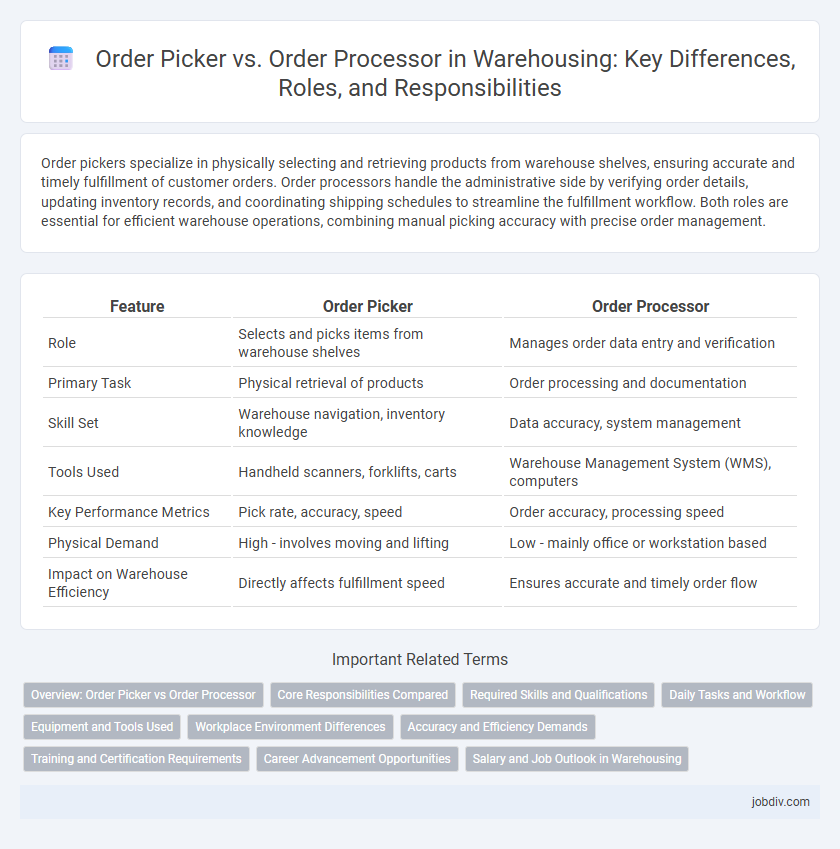Order pickers specialize in physically selecting and retrieving products from warehouse shelves, ensuring accurate and timely fulfillment of customer orders. Order processors handle the administrative side by verifying order details, updating inventory records, and coordinating shipping schedules to streamline the fulfillment workflow. Both roles are essential for efficient warehouse operations, combining manual picking accuracy with precise order management.
Table of Comparison
| Feature | Order Picker | Order Processor |
|---|---|---|
| Role | Selects and picks items from warehouse shelves | Manages order data entry and verification |
| Primary Task | Physical retrieval of products | Order processing and documentation |
| Skill Set | Warehouse navigation, inventory knowledge | Data accuracy, system management |
| Tools Used | Handheld scanners, forklifts, carts | Warehouse Management System (WMS), computers |
| Key Performance Metrics | Pick rate, accuracy, speed | Order accuracy, processing speed |
| Physical Demand | High - involves moving and lifting | Low - mainly office or workstation based |
| Impact on Warehouse Efficiency | Directly affects fulfillment speed | Ensures accurate and timely order flow |
Overview: Order Picker vs Order Processor
Order pickers physically select and gather products from warehouse shelves to fulfill customer orders, emphasizing speed and accuracy in inventory retrieval. Order processors handle the administrative side, verifying order details, updating systems, and coordinating order fulfillment through digital platforms. Both roles are crucial for efficient warehousing operations, with pickers focused on material handling and processors managing order data flow.
Core Responsibilities Compared
Order pickers specialize in physically retrieving products from warehouse shelves, ensuring accurate item selection and timely order fulfillment. Order processors handle the administrative side, verifying order details, updating inventory systems, and coordinating shipment schedules. While pickers emphasize manual collection efficiency, processors focus on data accuracy and order management.
Required Skills and Qualifications
Order Pickers require strong physical stamina, attention to detail, and proficiency with warehouse management systems to efficiently locate and retrieve items from inventory. Order Processors need excellent organizational skills, data entry accuracy, and familiarity with inventory control software to manage order verification and documentation. Both roles benefit from basic math skills and the ability to work under time-sensitive conditions in fast-paced warehouse environments.
Daily Tasks and Workflow
Order pickers focus on physically retrieving products from warehouse shelves based on customer orders, using equipment like forklifts or pallet jacks to navigate aisles. Order processors handle the administrative side, verifying order accuracy, updating inventory databases, and preparing shipping documentation to ensure smooth fulfillment. The workflow integrates pickers collecting items efficiently while processors validate and finalize orders for dispatch.
Equipment and Tools Used
Order pickers utilize specialized equipment such as electric pallet jacks, forklifts, and order picking carts designed to efficiently retrieve products from warehouse shelves. Order processors rely heavily on computer systems, barcode scanners, and warehouse management software to accurately capture and verify order details. Both roles leverage technology tailored to their tasks, with pickers focusing on physical retrieval tools and processors on digital systems for order accuracy and inventory control.
Workplace Environment Differences
Order pickers primarily operate on the warehouse floor, navigating aisles and using equipment like forklifts or pallet jacks to retrieve products, requiring physical stamina and spatial awareness. Order processors typically work in an office or control room setting, managing inventory systems, processing orders digitally, and coordinating logistics with minimal physical exertion. The work environment for order pickers is dynamic and physically demanding, while order processors experience a more sedentary, computer-focused environment emphasizing accuracy and organizational skills.
Accuracy and Efficiency Demands
Order pickers prioritize physical accuracy by selecting and verifying items to ensure correct fulfillment, directly impacting order accuracy and reducing costly errors. Order processors emphasize data accuracy and workflow efficiency by managing order entries, updates, and communications to streamline processing times and minimize delays. Both roles require precision but differ in execution; pickers focus on tangible item accuracy while processors enhance digital order handling efficiency.
Training and Certification Requirements
Order picker roles demand specialized training focused on safe equipment operation, inventory handling, and efficiency in navigating warehouse layouts, often requiring certifications such as OSHA forklift licenses or warehouse safety programs. Order processors typically require training in inventory management software, order accuracy protocols, and data entry skills, with certifications in supply chain management or warehouse information systems enhancing job performance. Investing in industry-recognized certifications ensures compliance, boosts productivity, and reduces operational errors across both functions.
Career Advancement Opportunities
Order pickers often start in entry-level warehouse roles with opportunities to advance into supervisory or inventory management positions through gaining experience and certifications. Order processors typically develop specialized skills in order accuracy and logistics coordination, opening pathways to roles in operations management or supply chain analysis. Both careers offer distinct advancement prospects depending on skill development and organizational needs in warehousing.
Salary and Job Outlook in Warehousing
Order pickers in warehousing earn an average salary of $29,000 to $40,000 annually, with job demand growing steadily due to increasing e-commerce activities. Order processors typically have a salary range of $30,000 to $45,000 and benefit from steady employment outlooks tied to inventory management and supply chain operations. Both roles are essential, but order processors may experience enhanced career opportunities due to the integration of advanced warehouse management systems.
Order Picker vs Order Processor Infographic

 jobdiv.com
jobdiv.com